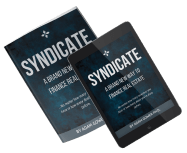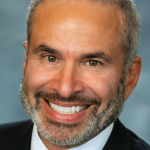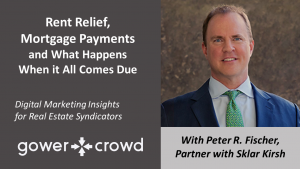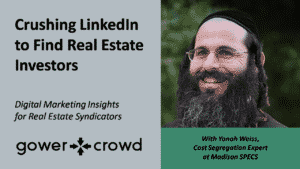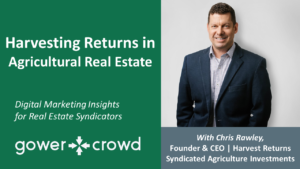Carlos Vigon, PaxCap Investors
Identifying and Investing in Distressed Real Estate
 Carlos Vigon, CEO and Founder of PaxCap Investors, LLC
Carlos Vigon, CEO and Founder of PaxCap Investors, LLC
Carlos Vigon, CEO and Founder PaxCap Investors, and I go way back to before the global financial crisis of 2008/09. Carlos has always been a visionary commercial real estate investor. He and I negotiated many deals during that downturn sitting on opposite sides of the table - and they were all distressed debt deals, collateralized by real estate.
Carlos set up a new distressed asset fund last summer which, naturally, was fortuitous timing and today you’ll learn what the drivers were for his setting up that fund and about the kinds of deals he's looking for.
So settle in for a fascinating discussion about opportunistic real estate, what to look for, how to find deals and what you have to keep in mind when investing in distressed commercial real estate projects.
What You're Going to Learn
- How Distress is Revealed in the Market
- Not Every Investor is Going to Like Every Deal
- Finding Investors for Distressed Real Estate
- Accessing Distressed Real Estate for Investment Strategy
- Consider Ownership Structure When Assessing Distressed Real Estate
- Removing Non-Real Estate Barriers to Liquidity for an Asset
- Underwriting Real Estate During COVID-19
- Calculating Real Estate Values During COVID Will Be Difficult
- How Real Estate Values During COVID Are Like a Tsunami
- And much more!
Related article: Tricks to Finding Distressed Properties for Sale Near You
Listen To or Watch the Full Podcast Here
Show Highlights
FOR REAL ESTATE DEVELOPERS
THE WHITE BOARD WORKSHOP
Learn the exact system best of class sponsors use to raise money online.
Not Every Investor is Going to Like Every Deal
Adam Gower: What you just described is a single investor. So a single investor capitalizing the fund. But, you will remember from the good old days of the Great Recession when we had so much fun, that there was more deal flow than you had capital for. Not just you, but really those that understood distressed real estate and how to capitalize on distressed real estate, there came a point where there was too much and there wasn't enough capital to buy it. If you could have done, you would have bought a lot more, but there was a restriction. There was liquidity. That's why prices went down — there wasn't the liquidity. There wasn't the capital. Even with one investor today, is that enough, do you think, to capitalize on all the opportunities you anticipate are going to be coming towards you now, this time?
Carlos Vigon: Well, no, I don't think it's enough. And that's why since we launched with one investor, last summer of course, I've been on a very informal roadshow with my longtime clients and investors and friends and family and — in almost all our area, they’re ultra-high net worth or high-net worth — just in concept, talking about our investment strategy and the premise. And right from the get go, even when it was totally contrarian, we had a lot of buy-in. And now it's a quick call. Almost without exception, everyone that I talk to wants in. It's really not so much a challenge to have the multiple investors. That's important because not every investor is going to want to get into every deal. It's kind of a mix and match. You put together the right cast of investors, if you will, depending on the deal.
Finding Investors for Distressed Real Estate
Adam Gower: What I was interested in, though, is understanding…as you know, since then I have started doing crowdfunding. I build these systems to help people find investors. These digital—
Carlos Vigon: Congratulations, by the way. I went on your website. It's really well conceived, well thought out, well executed. It's very impressive.
Adam Gower: Thank you so much. Very nice of you to say that.
And what I've done basically, is taken the task of at least the initial conversations, when you're raising money, out of the in-person relationships, out of the in-person. Now, you can look at content online and you can establish a relationship. So let me ask you this: with your current efforts, just curious — and we'll move on to the good stuff, which is the distressed real estate — with your current efforts, are all of your contacts in-person? Is it, for want of a better term, the traditional way of raising money where you’ll call somebody, you’ll ask for an introduction, you'll go meet them — when that was allowed — or you'll call them on the phone, etc. Is that the same thing? Is that what you're doing to establish those relationships?
Carlos Vigon: I'm not because I have been here in the big staycation with my family since March 13th. I'm talking to you from the same place where I've been almost 24 hours a day for the past, like 80 days, something like that. So fortunately, most of the investors that I've connected with that are interested in investing, interested in the fund, are people that I have long term relationships with. I've been doing this for 30 years in various incarnations of my career. And so it's mostly that and those kinds of meetings, or a phone call is enough. I haven't even gotten to the level where under normal conditions, it would call for an in-person meeting. Going forward, who knows what hurdle we need to exceed in order just to buy an in-person meeting, because this is also effective and efficient. But anyways, it's been mostly by the phone and email and just kind of keying on some strong relationships.
Adam Gower: Ok, so these are primarily existing relationships that you're tapping into, is that right?
Carlos Vigon: That's right. That's right.
Accessing Distressed Real Estate for Investment Strategy
Adam Gower: Define for me, what is distressed real estate, because you have a distressed real estate fund. So, what is distressed real estate?
Carlos Vigon: Well, let me tell you that it's not a value-add opportunity. I think if I get another email from a broker with a value-add opportunity, I'm going to start getting nauseas. And so, definitely, that's one of the facets. It isn't a value-add opportunity.
Here's what it is in my mind. It's a real estate asset where there's a situation that has to do with real estate and the situational has to do with a lot of things that really aren't directly involved with the real estate. For us, the qualifying definition of distress is that there's distress in the ownership structure. Then there's distress in the capitalization structure. Those are the two prerequisites. And that's where we start with our investment strategy.
It's almost like an inside-out approach because most funds or sponsors that you talk to, they hone in on a geography. They hone in on a product type. And then they hone in on a certain business model of what they're going to do with the property. We don't do that. That's almost secondary. It's a necessary aspect of our decision criteria, but it's not sufficient and it's not primary. If, at this real estate related situation, there is ownership distress and capitalization distress, then we look further. Well, what kind of property is this? Ok, so it's apartments. Yes, that's a kind of property that we know what to do with. We like that asset type. Or maybe it's a marina boat dock business on a lake someplace with some real estate. We might or might not be interested in that because it's just so far afield from our expertise and from our aptitude. It's in a major market, primary or secondary market? Yeah, we're probably in some tertiary markets. But if it's in a small town in Iowa, we probably are not going to be interested in that. But again, those are filters, secondary filters, to the qualifying problems with ownership and capitalization.
Consider Ownership Structure When Assessing Distressed Real Estate
Adam Gower: Let's talk about this current situation that we're in now. Again, you and I have dealt with the global financial crisis together last time. But this is a bit different, isn't it? Give me an example, like a classic case study, if you like, or an example of an ownership structure that would be something that would be of interest to you in terms of the kinds of deals that you're interested in.
Carlos Vigon: There are various devices that have been created over the past 20 or 30 years to facilitate different forms of ownership that have advantages and disadvantages all bundled in, that you take it all with the good and the bad of it. One, for example, is tenants in common structure. There's always been tenants in common ownership. But back in the 2000s, it was a big thing. And I'm not even referring to that TICs per say. But I am referring to properties where there's multiple ownership, they’re on title as tenants in common and one owner, let's say, who's in the restaurant business. All of a sudden, his total economic life has been totally changed and he is no longer in a position to support his ownership interest as a tenant in common in that property and he wants to sell his fractionalized interest.
And so, we would approach that owner and those owners to buy just that part of the ownership and it fractionalizes their property, sells at a discount to the whole interest. And then, once we have the fractionalized interest, then we would perhaps solve to have complete ownership of the property there, subsequently creating a creative effect on the value of owning a complete property as opposed to a discounted fractionalized interest, for example.
There are properties owned in trust with significant disputes amongst the beneficiaries. There are properties owned by corporations where the corporation's insolvent and no longer wants to maintain real estate on their balance books. There are family situations, husband and wife divorce, owner dies, heirs can't settle on what to do with the property and how to dispose of it…we step in and kind of rescue that situation. And so those are some scenarios. There's so many. Insolvency, bankruptcy, ownership where it's a Chapter Eleven and they just want time to have a good disposition scenario for the debtor in possession.
Removing Non-Real Estate Barriers to Liquidity for an Asset
Adam Gower: For example, when you and I first started working together closely was when you were looking at notes. So that was a bank that had a non-performing asset, a note, and you were looking to buy that. So maybe describe something about what it's like to buy a note and what's involved in that. I presume that's something you'd also be interested in now as well.
Carlos Vigon: That's one of the primary avenues that we find that work for us in our investment strategy. The underlying principle here is to take an asset that for various reasons is unmarketable and not liquid in the sense of to what extent there's a market for it, and then go in and cure those defects that make the property less marketable than it would be otherwise. And once we remove those defects to full marketability, then we could go and present the market, expose it in the retail market as a value-add opportunity, for example. Or we — again, I and Andrew — we have a long record of being really good value-add owner operators. Some of these deals we might just take on the value-add facet of it, too. But in most, we would not. We just leave that to the very good sponsors that focus on that and get on with the focus of our business.
Adam Gower: Oh, Carlos, this is just so exciting to me to be talking about this again. Ten years—
Carlos Vigon: It’s so nostalgic.
Adam Gower: Oh, it is, but it's back again. So what do you think—
Carlos Vigon: The whole thing.
Adam Gower: Right? What you're describing for those that don't actually know — it's that one guy in my audience that doesn't know — is that you're talking about removing non-real estate barriers to liquidity for an asset. An asset somehow got itself locked into a financial or, what was the term you used, ownership structure of some sort that makes it illiquid. Nothing can be done with it. And so, you come in and you work out those problems. And once those problems have gone away, that then makes the asset liquid again, right? That's basically right.
Carlos Vigon: That's right. So, buying a non-performing note is just one way to do that. We buy the note at a discount to face. We have some basic assumptions about the property and what it's worth given the likely NOI. And then we have to have a path to control of the property. We're not in the business of just buying non-performing notes and getting a yield. That would be a worst-case scenario for us. That doesn't fit into our investment strategy. We don't want to get caught up in being note holders.
Underwriting Real Estate During COVID-19
Carlos Vigon: So, we now are in a similar but much greater kind of change that really won't resolve until we have a vaccine. That means now that, this is really important to me in my pursuit of deals. And it goes to our underwriting, especially in our assumptions, because what is a good deal? What is the frame of reference? This distress is really different from when you and I were pounding out deals 2008, 2012. Here's the big difference, Adam. Is that, when I looked at a deal in 2008, 2012, let's say a hotel, I knew that that hotel that was like 60 percent vacant — that had an NOI of 25% of where it was in 2007 — I knew that all I had to do was restore the operation to what it was doing, how it was doing it, where it was doing it in 2007.
I can't do that now. Now, I have to completely reengineer, reimagine. If I want to occupy that hotel in the short interim period until we have a vaccine, if I want to have a pro forma that shows this thing having a full occupancy in the near future, I have to reimagine and reconfigure that hotel. I have to get rid of anything that anybody has to touch. I have to eliminate any shared spaces. I have to give each room individual ventilation systems, for example. And this whole protocol… it all has to be restructured. Then I have to know, okay, so how much is someone going to pay? What's the room rate going to be? And by the way, I'm not a hotel guy, I just fell into that example, because I think hotels are probably the most impacted type of property from all this. Then what's the room rate going to be? How much is this operation going to cost me? And what is that NOI? Okay, now that's the NOI given the risk environment going forward in real estate, perceived by investors, what cap am I going to have to put on that? And there's the value, alright, and then from that value, that's where I could work backwards and then start doing some discounting in the underwriting to see at what price do I have to buy it today to have an exit scenario, either a recapitalization or a sale, when it's totally reconfigured and redesigned as a post-coronavirus hotel.
Adam Gower: Yes, isn't that interesting.
Carlos Vigon: And that goes for retail, that goes for office. Somewhat for multi-family as well. Not as much, but somewhat for multi-family as well. So, it's a whole other layer of complexity in the underwriting process that we didn't have before. And for me, that's a big difference.
Calculating Real Estate Values During COVID Will Be Difficult
Adam Gower: It is, because now, actually. So I've always said that the, actually just as we talk about it, it's actually quite interesting to think this through. Especially during the last downturn, I came to think that there was no such thing as distressed real estate. There was only distressed capital structure. It was the finance on a project that was distressed. But actually, when you think about it, what you're talking about is that actually it is the real estate itself, because of this pandemic, that itself has become distressed in the sense that a hotel might be obsolete, or some of it may now be obsolete or—
Carlos Vigon: Incrementally so, right?
Adam Gower: Right?
If that's happened, even if it's just parts of it here and there, that the economics have also shifted dramatically. And it's because we don't know what those, that obsolescence actually looks like yet, that it makes it very difficult to calculate value. That's what you're talking about. We're in it. We still can't see where we're headed.
Carlos Vigon: Yeah. I mean if you had a restaurant with 200 chairs and that operator-owner was able to pay a certain rent based on having his 200 chairs filled on a Friday and Saturday night — well, now he only has 100 and that's how it's going to be going forward for the foreseeable future — then how much can the landlord charge? How much is that rent, is that worth for rent? And then what does that translate to is NOI and that new value for the property?
Adam Gower: Well, what does it even mean that some businesses aren't viable, even with zero rent? I don't know, restaurants are, I don't know. I'm not a restauranteur. I hate it all.
Carlos Vigon: Neither am I.
Adam Gower: But I think they run on very thin margins. So, if you're going to take half the number of people, half the number of turnover in an evening, is there any possible way that it can be viable? At the end of the day, you buy something that's in bankruptcy and you figure out all your legal costs and the time it's going to take you to get it through the process.
How Real Estate Values During COVID Are Like a Tsunami
Adam Gower: You know, that kind of risk, your traditional workout scenario: at the end of the day, does the real estate have any intrinsic value left, in some cases. So, how are you dealing with that and how are you articulating that to your capital?
Carlos Vigon: You know the one way. The net of it is, that how I'm articulating it to our capital, is that right now, when we've been looking — we've been aggressively looking since last year and I have not yet seen the right opportunity where I'm comfortable that we're going to have an exit scenario that’s going to give us some multiples return on equity, which is kind of our investment metric. We're not going for IRR, we're not going for cash on cash return; we're looking to multiply the equity. This is a high-risk, high-reward, high-adventure kinds of projects, right?
Adam Gower: And so, we think that, because it's so early, because we're still in the tsunami and we don't know the extent of the damage and what it's going to take to recover and what all that looks like. We think there's lots of time to bide and wait and see and let some of these answers become clear about what is this property going to be worth? Because you find now, cash deal flow is starting to come out and you see that non-performing note and mostly it’s what I've been seeing. And it's hard to know, “At what price do I have to buy it at? What exit scenario? What value is it that you put on it?” And it's, in some cases, almost impossible to determine right now.
Carlos Vigon: Alternatively, if you're really bold and brave and want to maybe have some big wins and possibly some big debacles, think of what a goalie does at the end of a soccer match: penalty kick. You can't know where the ball's going and if you wait to see where it's going, it's too late. You just got to pick a side. So, you could make some really bold projections and extrapolate and guesstimate and say that, “Hotels are really going to resume their prior operation, but it's going to take five years.” Let's go on that assumption, underwrite it that way instead of thinking that we have to get it operating in one or two years and we have to redesign the whole hotel. You either have to make some big assumptions that are high-risk without a lot of reliability, or you have to wait and get more information.
Related to this episode:
A guide for remote workers
How to Setup a TV Studio Quality Home Office
